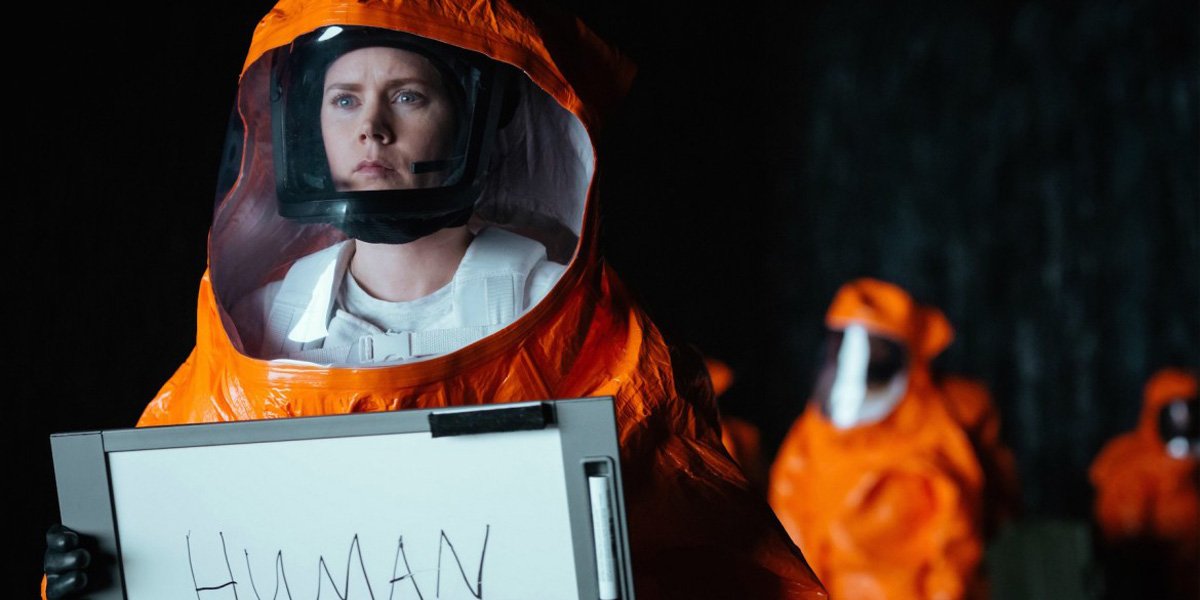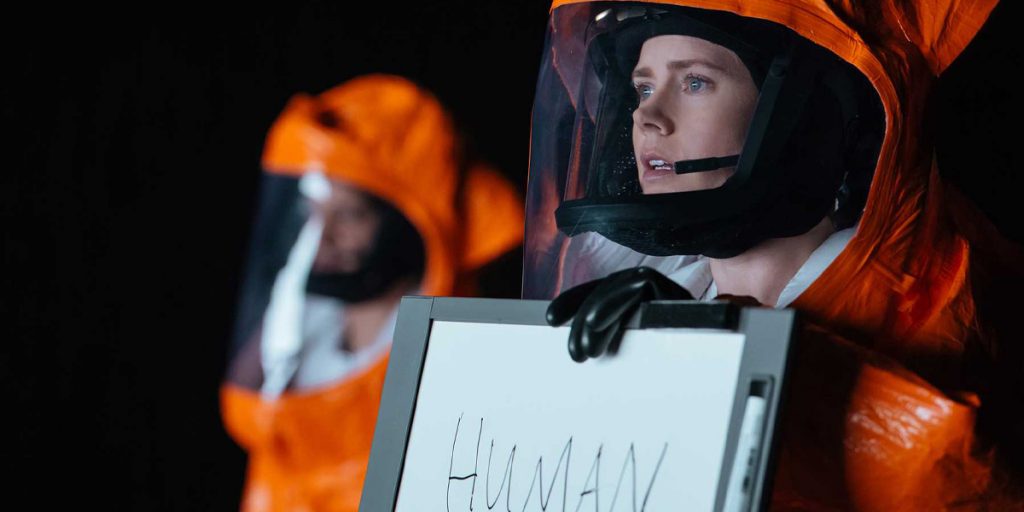In Arrival, Denis Villeneuve revolutionizes the sci-fi genre with a story that contemplates the nature of time and communication in this moving, yet ingenious film.
Communication is the foundation of society. It allows civilization to pass down ideas, beliefs, and rituals from generation to generation, culminating into various, unique cultures. Although communication can be constructive, lack of communication can have the opposite effect and breed misunderstanding and havoc, ultimately leading to catastrophe. Denis Villeneuve’s Arrival demonstrates the gravity communication has and how it affects the manner in which humans process time, memory, and existence.
Based on Ted Chiang’s “Story of Your Life”, Arrival brings to life the thought-provoking journey of linguist Dr. Louise Baker (Amy Adams, of Hillbilly Elegy and Zach Snyder’s Justice League) and physicist Ian Donnelly (Jeremy Renner, of Avengers: Endgame and Wind River) who have been commissioned to study one of the twelve spacecrafts spread randomly across the world. In the grassy plains of Montana surround by an encampment of U.S. soldiers, Louise and Ian immediately learn that the extraterrestrial’s complex language is made up of palindromes and circular symbols, a language far more advanced than the human language. As Louise attempts to communicate with these “heptapods” to inquire more about their mission on Earth, she continues to have “flashbacks” of would would seem to be like a past life that she does not remember. As each camp site pursues to unravel the mystery of these spacecrafts, communication between each location fractures as many begin to suspect the true intentions of the heptapods.

Director Denis Villeneuve has never been one to shy away from sophisticated and ground-breaking films, from Incendies, a heartbreaking story following twins that journey to the Middle East to uncover their mother’s past, to Sicario, dealing with an FBI agent tasked to aid in the drug-war at the U.S. and Mexico border. Arrival joins these movies in becoming some of the most refined films in our time. Villeneuve creates a highly intricate film revolving around the themes of communication and time. Undoubtably, communication is a fundamental aspect of the film. Louise and Ian sacrifice their time and life to decipher the heptapod’s language in order to have a peaceful exchange not only with the heptapods, but with humanity itself. In essence, the power of communication allows society to unravel any misconceptions, prevent problems, and build trust with one another. This is precisely how Villeneuve perfectly ties the bow at the end of his film.
Furthermore, linguistics is the study of language and its structure, and in many ways, Villeneuve’s film is guided by a similar template. Through Louise, Villeneuve shares intermittent scenes of what appears to be an alternate life. These scenes are pieces of a greater conception that does not fully take shape until the resolution of the film. Not only does the audience become aware of the heptapod’s mission on Earth at that point, but also of the structure of Villeneuve’s story. Like the heptapods’ circular symbols that change humans’ linear perception of time, Villeneuve’s unique screenplay revisions how audience perceives the film, ultimately creating a breathtaking experience.
Oscar-nominated and Golden Globe winner Amy Adams absolutely mesmerizes the audience on screen with her compassion and intellect, while also providing a deeply emotional factor to the film. Although Louise and her daughter share very little screen time together, Adams’ charismatic and tender love for her child is incomparable. When she experiences those flashbacks, her character is in emotional turmoil and yet, she’s not completely sure way she’s having those episodes. Above all, Adams’ character possesses the compassion and intellect to perform her job, giving Arrival an effective emotional undertone that is essential to film’s success.
Moreover, her co-star and Academy Award nominated Jeremy Renner offers an opposing perspective in regard to translate the future. Unlike Adam’s character, Renner communicates his disapproving thoughts about using the heptapods’ “tool” to read the future. Renner’s Ian feels betrayed and cheated due to the fact that Louise did not disclose one important event that would eventually break Ian in a number of ways. While Louise’s character embraces the change brought on by the heptapods, Ian in return resented this gift, and decides to see language as a misfortune instead of an opportunity.
Arrival is not your typical alien invasion movie. Villeneuve takes the genre of science fiction and creates a tremendously well-designed film with sophisticated plot points and beautiful imagery. While other movies with the same genre tend to focus on the warfare and bloodshed that is caused to society during an invasion, this film instead focuses on the power of communication and time. By deciphering the alien’s language, Louise takes a step toward evolution by learning how to interpret time in a non-linear way. In spite of it being a ground-breaking discovery, many will wonder if this new way of time and communication will benefit society or will it be used in other ways for their own selfish benefit.
Arrival is now available to watch on digital and on demand. Read our analysis of the concept of time in Arrival.

 loudandclearreviews.com
loudandclearreviews.com
